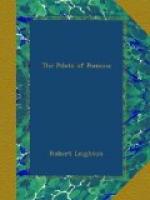“Take his offer, lad,” advised Jack Munroe.
“Ay, take it, Tommy,” added another. “Ye’ll mebbe never hae anither such chance again.”
“Nay, dinna be a fule,” said Jim London. “The auld swindler kens the thing’s worth mair than he offers. Gar him gie ye anither ten shillings.”
“No, no,” protested the Jew, speaking in broken English. “I not want ze ting. Wot use I make of it?”
He was about to hand it back to Tom.
“Well, well,” he continued, again examining the gem. “If you not satisfy, den I gif you six shilling more; wot you say, eh? Dat make ten pound and six shilling, English. It not worth one penny more, I tell you.”
“Mike it ten guineas,” urged Kinlay.
“What! ten guineas? Himmel, mine child, you make me ruined!” exclaimed the Jew.
“Give the lad the ten guineas and be done with it, Isaac,” said a young seaman who appeared to know him. “You’ll get your own price in Amsterdam.”
“Well, ten guineas I will gif—two hundred and ten shilling!”
And the old Jew slowly counted out the money from a dirty canvas bag that he took from his belt. I saw his little black eyes glitter as he dropped the sparkling gem into the bag and buttoned up his coat, before handing over the money.
Kinlay pocketed the sovereigns, and then looked round the crowd of faces about him with an air of extreme satisfaction. At the same time old Isaac turned to a Dutch sailor who was addressing him in their own language. By the fox-like look in the Jew’s eyes I understood that he, on his part, was not really discontented with the bargain he had closed.
But Tom had evidently not disposed of all his valuables, for, just as Isaac was slipping away, he held him by the sleeve and showed him a handful of the viking’s coins and rings, whereupon the old Hebrew renewed his bartering, with the result that Tom disposed of all his remaining store for the sum of two additional pounds.
The crowd was breaking up, and the Jew again slipping away, when I called out to him, thinking I would tell him that there were some more of these things in Stromness, and believing for the moment that Mr. Drever might have some wish to deal with so generous a purchaser. Isaac could at least tell him what the treasure was worth, I reflected.
“Will ye buy any more o’ these things?” I asked, when he came to my side.
“Well, I want nossing more, mine young friend,” he replied. “I haf make a very bad bargain already. But what have you? Any more of dose pretty tings?” and he indicated the gem that he had bought from Kinlay.
I thought at once of my magic stone that was suspended at my neck under my guernsey. I produced it, though of course I did not mean to let him have it at any price.
“Is this worth anything?” I asked.
But I had no sooner brought it forth than I felt a tugging at my sleeve. I turned round and saw old Davie Flett frowning at me meaningly.




